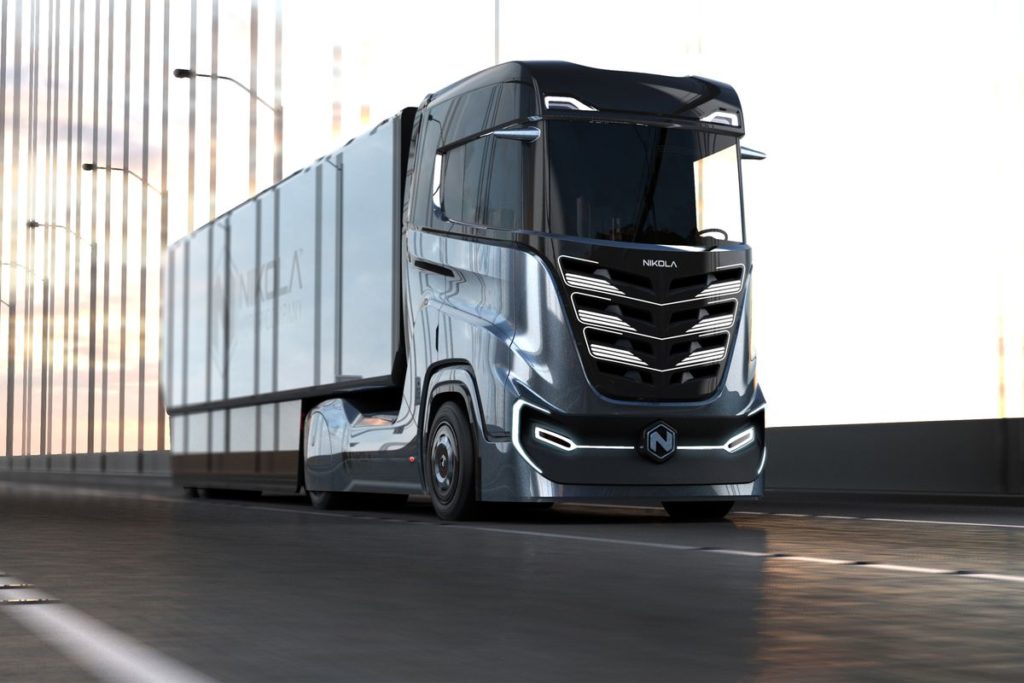Hyundai Motor Co. has an ambitious plan to wean the global trucking industry from fossil fuels by creating green commercial trucks with the same power and range as their diesel counterparts, choosing hydrogen over electricity.
The South Korean automaker unveiled the cornerstone of its strategy in Atlanta last month by showing the concept of its planned HDC-6 Neptune hydrogen fuel cell truck. Styled like a 1930s Art Deco steam locomotive, the truck could be plying U.S. highways by 2024.
Human-caused climate change dictates the end of diesel trucks, said Sae Hoon Kim, vice president of Hyundai’s fuel cell center.
“This is about survival, and we don’t have that much time to make this move,” Kim said.
Hyundai plans to build a production capacity of 500,000 fuel cell systems for passenger and commercial vehicles by 2030 at a cost of about $6.4 billion.
While fossil fuel will be the primary energy choice for both passenger cars and commercial vehicles in the U.S. for years to come, other nations are already working to decarbonize transport.
Greater than 1/2 of Norway’s new vehicle sales are electric cars according to the Wall Street Journal. Paris, Madrid, Barcelona, London and Rome all are preparing to ban either diesel or all internal combustion vehicles from their city centers over the next decade. Amsterdam wants to allow only emission-free vehicles by 2030.
Hyundai and a handful of rivals believe these diesel bans will provide the impetus for hydrogen commercial truck development.
Other truck and car companies also see hydrogen as a fuel of choice for transport.
Nikola Motor Co., a Phoenix startup, plans highway testing of its hydrogen fuel cell semi-tractor next year. Budweiser brewer Anheuser-Busch will test Nikola trucks in its fleet. The beer company said it plans to buy up to 800 of the hydrogen fuel cell models for its fleet of long-haul delivery vehicles.
Nikola also wants to remove risk from its customers. It will combine the major expenses of truck ownership and operation into a single monthly lease payment. But that deal requires a million-mile lease at the cost of 95 cents per mile, or $950,000 for the life of the contract – typically seven years.
Toyota Motor Corp., which makes the Mirai hydrogen fuel cell passenger car, also is developing commercial vehicles. It is providing fuel cell electric powertrains for a project with truck builder Kenworth. They are building 10 zero-emission Class 8 trucks. The project is part of a $41 million Zero and Near-Zero Emissions Freight Facilities grant from the California Air Resources Board. The vehicles will be used at the Port of Los Angeles/Port of Long Beach complex, primarily moving containers to and from California’s Inland Empire region about 70 miles away. It is also testing a hydrogen fuel cell yard truck to move shipping containers within the Port of Los Angeles.
Even parcel giant UPS is dabbling in the field. It is developing a small fleet of hydrogen fuel cell delivery trucks. It wants 40 percent of the fuel it uses to come from sources other than conventional gasoline and diesel by 2025.
Companies are interested in hydrogen fuel cells because the technology could work well for freight and logistics, Antti Lindstrom, an analyst with IHS Markit said.
The fuel cell stack works like a mini power plant, converting hydrogen to electricity that can run the trucks. Drivers can fuel their vehicles almost as quickly as they can with diesel. The system is lighter than the power supply for a similar battery-electric truck.
“But without infrastructure, this is just an interesting technical experiment,” Lindstrom said.
Trucking companies won’t want to invest in hydrogen vehicles unless they know there will be places to get the fuel. Fueling companies don’t want to invest in stations if there are no trucks on the road.
“It is a chicken or the egg example,” Lindstrom said.
Hyundai believes it can solve the problem.
Its first commercial venture is in Switzerland. It has a joint venture to use 1,600 hydrogen fuel cell trucks to transport goods for Coop and Migros, Switzerland’s two largest retailers. The vehicle will have a range of about 190 miles and will tow a 32,000-pound trailer. The trucks will get their power by pairing two of the 95-kilowatt fuel cell stacks Hyundai uses in its Nexo SUV. Deliveries start next year. All the trucks will be in operation by 2025, according to Maik Ziegler, Hyundai’s fuel cell EV vice president.
An unusual road tax in Switzerland created a business case for producing the trucks and investing in a hydrogen fuel infrastructure, Ziegler said. Green vehicles are exempt from a Swiss tax on commercial vehicles that works out to about $1 per kilometer traveled.
It takes about 10 daily truck customers to create enough business to pay for a filling station, Ziegler said. That compares to about 200 passenger cars. When all the trucks are on the road, Switzerland will have a network of more than 150 hydrogen stations.
Hyundai plans to offer the trucks in a pay-per-use model. It’s similar to an experiment Volvo Trucks is running with mine operators for autonomous trucking. Driverless Volvo trucks move rock from a mine to a port in Norway. The truck company gets paid by the load.
Such plans make sense for new technology, Ziegler said. They remove customer questions about the operating expense and resale value of new technology.
The strategy also is a way for the automaker to market its trucks against the battery-electric vehicles that will be its main rivals for green shipping. Hyundai is confident that hydrogen is a better way to store energy than batteries.
A truck in the heaviest Class 8 truck weight segment requires about 8 tons of batteries to have a 311-mile range, Kim said. A hydrogen system – including the fuel cell stack and tanks – weighs about 1.5 tons.
“It will have less weight so you can put more cargo on the truck,” he said. That translates into higher profits.
Since refueling takes about the same amount of time as filling a diesel truck – much shorter than charging batteries – savings can be seen with faster delivery times.
Still, there are significant hurdles. One is infrastructure. But Ziegler said commercial contracts for hydrogen fuel cell trucks would pay to build that out. Nikola has the same belief. By default, the commercial market also creates a fueling network for hydrogen passenger cars.
The hydrogen also has to be produced using renewable systems, such as solar energy, or there is no environmental benefit, Kim said. Hyundai has a partnership with H2 Energy to build a supply chain for renewable hydrogen in Europe.
Hyundai believes fuel cell technology has applications beyond trucks and passenger cars.
“We are now developing buses, trams and small trains. We have some government development work for boats and shipping,” Kim said. “A fuel cell is simply a power generator, and there can be many uses.”



